
At the Neo-futurist theatre, my guest and I were led through an alley, to the back entrance of the theatre for their production of “Trust Us/Screw You”, a show largely about the history of Chicago and American con-men. We were told before we could even ask that the use of the atypical entrance was a way of creating ambience. Though a somewhat basic tactic, it was also fun and largely effective in a theatre whose idiosyncratic performance space makes traditional technical apparatus such as set and lighting so difficult that they are often underused to the point of being nearly non-existent.
The Neo-Futurist’s write their own material and use their own names, and actors Phil Ridarelli and Dan Ker-Hobert have created and performed an interesting, highly intelligent, and entertaining piece about the history of conmen and con-games in America and Chicago which utilizes intense audience participation (although you are never quite sure what parts are real and which are staged); a live band, which appear one by one on the stage during the show; and a piece which lightly draws upon, and engages with, meta and invisible theatre (genres not always associated with the word “light”). We hear the story of the “Yellow Kid” who sold the “Cure of the Orient” in Chicago; “Soapy Smith,” who, through the use of a shill, sold wrapped bars of soap that allegedly had money in them; Walter Freeman and James Watts, slightly less romantic figures who found ways to allow non-licensed surgeons to perform lobotomies; Pastor Peter Popoff, a televangelist who performed fraudulent faith healings; Charles Ponzi, who we are told “may “simply have been bad at math;” and Bernie Madoff: the real, low-life, criminal.
Early on, these stories are represented as romantic (with the help of the superb sound design by Jason Meyer whose ghostly sounds capture the past, nostalgia, and American fascination with crime as well as fun and convincing costumes by Meredith Miller). We hear stories of “the noble grafter,” are told that the “American confidence game is an art form, not a crime,” and are given a step by step lesson on how to execute it. But as the stories become more and more recent in time and space, they turn tragic, culminating in anecdotes about how Ridarelli and Ker-Hobert have been conned in their own lives. The scene in which Ridarelli is deposed over the circumstances under which he bought a condo that he did not know was in need of extremely expensive repairs is particularly heart-rending, and the suggestion that college tuition may be the ultimate fraud may have struck a note with the audience which was fairly young. 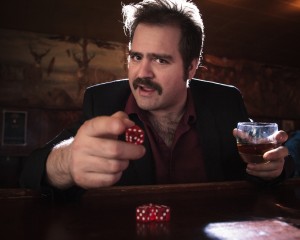
Nonetheless, the show is more light-hearted in tone than anything with witty dialogue and occasionally crude, but always very, funny humor. Audience members are invited down on stage where they see their wallets, phones, and money are taken from them, sometimes in the most elaborate ways (they are all returned at the end of the show). But all the while more serious questions are being posited about a possible analogy between performers and conmen. We are told that “it is impossible to con an honest man, but honest men don’t go to the theatre,”so that unless “you’ve come to the theatre to be cheated, you’ve never been to a play before,” and that “The brighter the lights and the bigger the set [not features of the Neo-futurists] the more you’ve been cheated.”
That said, usually in a theatre, we know we are watching a performance—although during this play, the distinction between what being performed and what is being improvised with audience members, or even what was actually happening, could be hard to deduce, much like when you know you are watching a conman or magician, but cannot see the trick. Ultimately, the play raises the question of whether or not con-men are, or were in the past—when con artistry was less elaborate, more intimate, and direct—simply actors engaging in that most controversial of all genres “invisible theatre” in which the audience does not they are watching a performance, but doing it for a profit which is a crime.
Trust Us/Screw You runs at the Neo-Futurist Theatre located at 5153 N. Ashland Street through June 13, 2015 with performances Thursday through Saturday at 7:30 pm. Regular Tickets are between $20-25 dollars. Student and Senior Tickets are $10. Thursday is pay as you can. They can be purchased by calling 773-275-5255 or by visiting www.neofuturist.org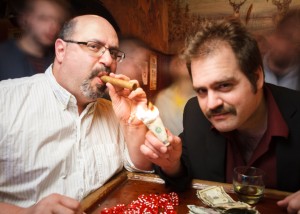
To see what others are saying, visit www.theatreinchicago.com, go to Review Round-up and click at “Trust Us/Screw You”
\

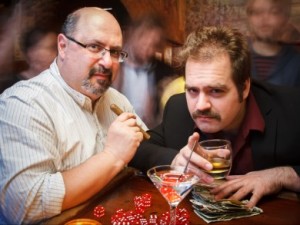

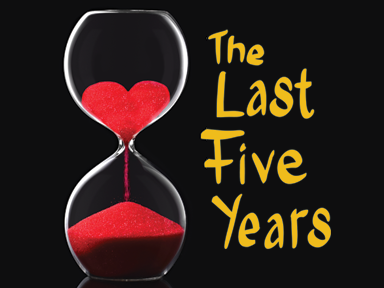

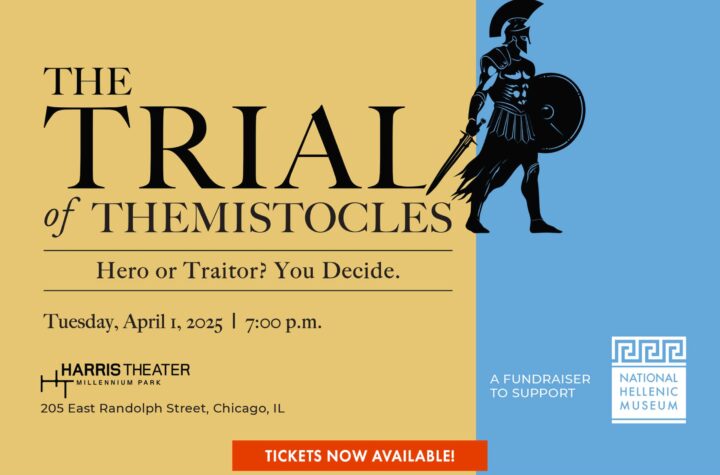
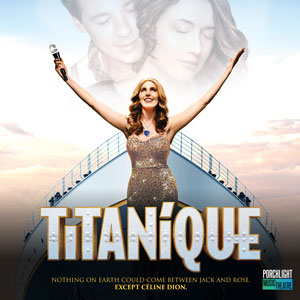
More Stories
“The Last Five Years” MILWAUKEE
“The Trial of Themistocles” reviewed by Julia W. Rath
“Titanique”